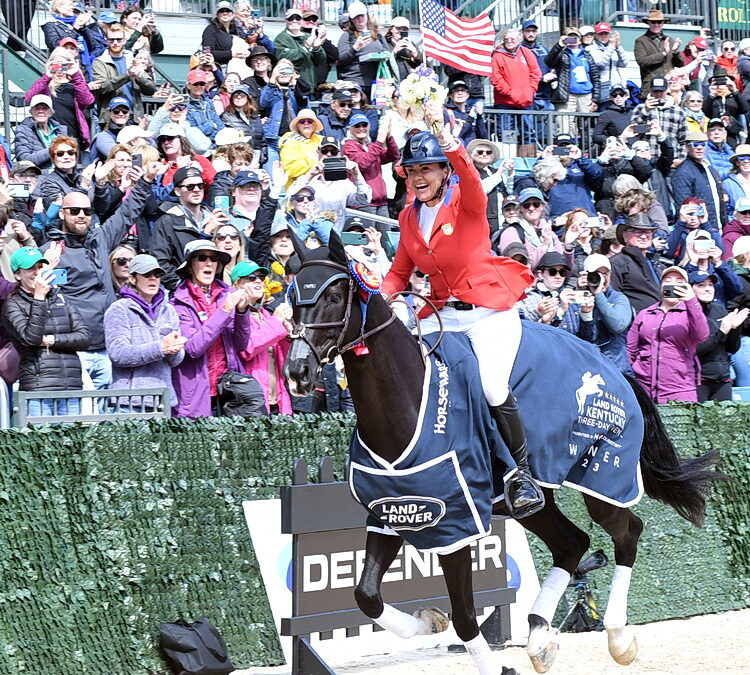
by Nancy Jaffer | Dec 29, 2023
It’s time to recount the big stories from this website that made an impact in the year just past, in addition to some that weren’t earth-shaking, but are worth remembering nevertheless. If you want more details on any of these items, click the search box on this website’s masthead, or on the “previous columns” icon.
In New Jersey, the biggest story was the revival of the Essex Equestrian Center in West Orange. We ended 2022 with news that it was closing. But 10 months later, trainer Brianne Goutal-Marteau revealed she and her husband, Romain, had bought the venerable facility and would be refurbishing it.
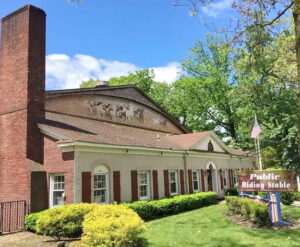
The old Essex Equestrian Center.
The story got a huge reaction, with some people who hadn’t been there in decades rejoicing that an icon of their past wasn’t vanishing after all, while others were simply happy that the site would not be the scene of more housing in the suburban town.
There was no reprieve, however, for the iconic Tempel Lippizans. After 65 years, this wonderful stable and enterprise in Illinois announced it would shut down, as the family that owned it was going in a different direction.
Further afield, word that Aachen in 2026 would be hosting what in effect is a rebirth of the World Equestrian Games was welcome news; no one presents shows better than Aachen does.

We held our breath until the U.S. show jumpers finally qualified for the 2024 Paris Olympics, doing it in a last-ditch attempt at the Pan American Games in Chile. That was way too close for comfort.
It was announced that the new League of Nations (As I’ve often asked, why name something after an organization that couldn’t stop World War II?) will be making a stop at the World Equestrian Center in Ocala, another boost for that amazing new facility.
Tamie Smith became the first American to win the Land Rover Kentucky 5-star event since 2008, taking the title with the intrepid Mai Baum.
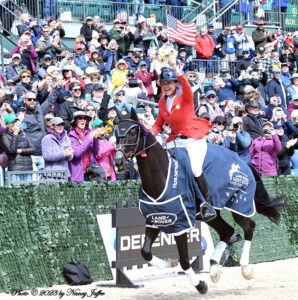
Tamie Smith and Mai Baum scored a victory for the U.S. at Land Rover Kentucky. (Photo © 2023 by Nancy Jaffer)
The European championships highlighted the nations to watch at the Paris Olympics. The British were awesome in eventing, with team gold and individual gold and silver to their credit, and they also won team gold in dressage, as well as individual silver and bronze.
No one, though, has bested Germany’s Olympic and World Cup champion Jessica von Bredow-Werndl and TSF Dalera BB, who took the European freestyle title after finishing first in the Grand Prix and Special.
Sweden finished its triple crown of Olympic and world championships show jumping gold with a team victory in the Europeans, while Switzerland’s Steve Guerdat captured the individual title.
The FEI World Cup finals made its second appearance in Omaha, with vaulting included, along with show jumping and dressage. It was six years since the last U.S. Cup finals (also in Omaha) but it will only be three years until the next, in Fort Worth in 2026.

Lisa Roskens, the woman behind the Longines FEI World Cup finals in Omaha with winner Henrik von Eckermann of Sweden, runner-up Harrie Smolders of the Netherlands and Hunter Holloway of the U.S. (Photo © 2023 by Nancy Jaffer)
The Washington D.C. International Horse Show said goodbye to the puissance, noting it was hard to get entries, but jumping a big wall was still popular on the other side of the Atlantic, most notably at the Dublin, Royal Windsor and London horse shows.
An ongoing saga is the battle over constructing housing on a parcel of Wellington, Florida’s Equestrian Preserve. More than 40 hours of hearings were held on the matter, which is connected to plans for an expanded Wellington International showgrounds on another parcel. This story is continuing into 2024, with thousands of people protesting losing any part of the preserve, as the Village council gets ready to vote on the matter.
Equestrians in trouble included Andreas Helgstrand, whose dressage training center was the subject of a Danish TV undercover documentary on methods that involved rollkur, as well as use of whips and spurs that left marks. Andreas said the facility was cleaning up its act, but he was barred from the Danish equestrian team until at least Jan. 1, 2025, though it could be longer.
Show jumping World Cup champion and 2012 Olympian Rich Fellers was sentenced to more than four years in federal prison for sexual abuse of an underage student.
Meanwhile, dressage trainer Michael Barisone was released in November from a psychiatric hospital, more than 18 months after a jury found him not guilty of attempted murder by reason of insanity in the shooting of a tenant at his New Jersey farm. He hopes to return to competing, but first has to deal with a SafeSport suspension.
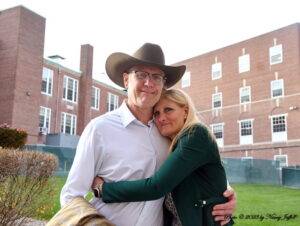
Michael Barisone with partner Lara Osborne after his release. (Photo © 2023 by Nancy Jaffer)
There was much more that happened in 2023, of course, and you undoubtedly have your own special equestrian memories of the year.
But for many people, one of the most special stories–a tearjerker that was amazing–involved Cody Dorman and Cody’s Wish. We’re talking horse racing here, not this website’s usual fare of non-racing equestrian sport, but it’s worth some reflection.
Cody, a Kentucky resident, had a rare genetic disorder that caused seizures and left him unable to walk or speak; he communicated by using a tablet. In October 2018 Cody went to Godolphin’s Gainsborough Farm to meet a foal, a session arranged by the Keeneland racetrack and the Make-A-Wish Foundation. The weanling to whom he got introduced was a son of Curlin who wasn’t afraid of Cody’s wheelchair and laid his head in the boy’s lap. It was an instant connection.
The colt was named Cody’s Wish, and Cody Dorman lived for the young horse. Following the thoroughbred as he grew became Cody’s mission, and he often was at the track when the colt ran. The horse always was drawn to Cody; the two had an unbreakable bond.
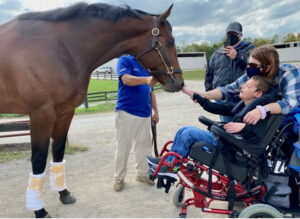
Cody Dorman and Cody’s Wish.
At the Breeder’s Cup, where Cody’s Wish scored a narrow victory in the Dirt Mile and survived an inquiry in his last race, Cody Dorman was on hand to bring him luck. His mission accomplished, 17-year-old Cody died on the way home to Kentucky. The timing was such that many spoke of divine intervention. It certainly makes you think…
Cody Dorman is one of the many people in horse sport that we lost this year. We’ll be running a story about some of them on Sunday, so you can toast their memory while ringing in the new year.
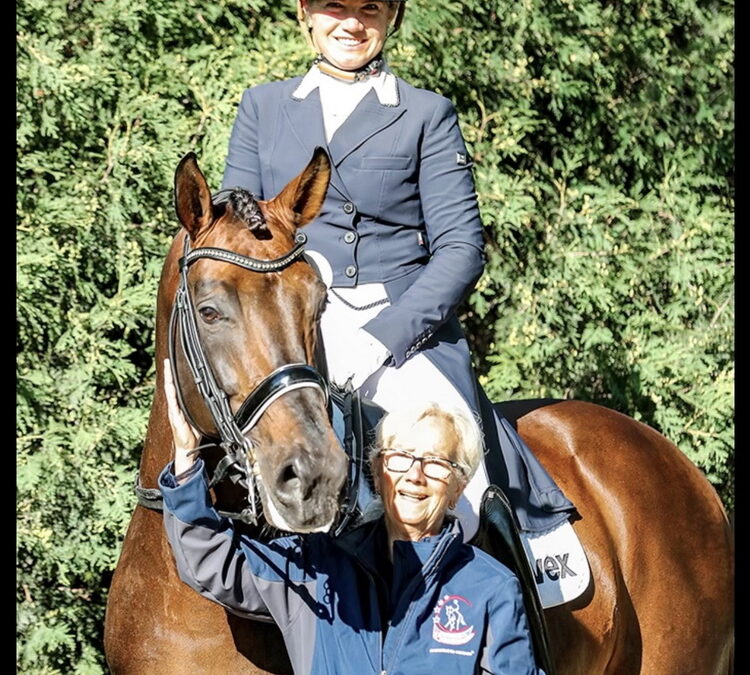
by Nancy Jaffer | Dec 28, 2023
Barbara Hay’s life focused on raising young horses and training young riders.
She died at her Rainbow Ridge Farm in East Amwell, N.J., on Dec. 27, just three days short of her 72d birthday.
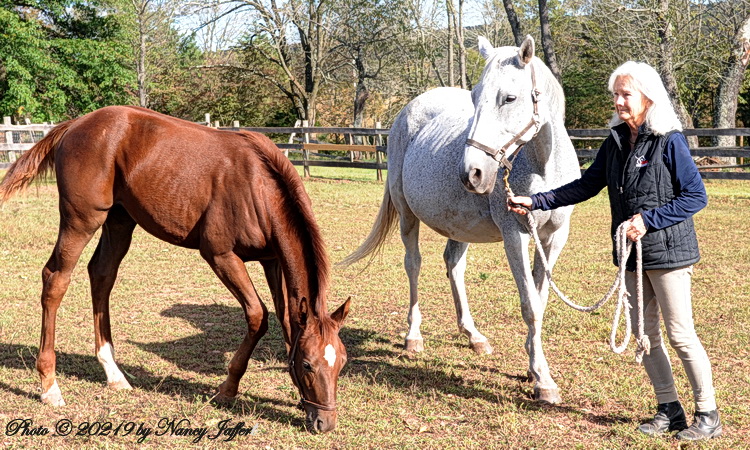
Barbara Hay on the farm with her horses. (Photo © 2023 by Nancy Jaffer)
A national examiner for the U.S. Pony Club who was the chief horse management judge at many Pony Club rallies, Barbara never lost sight of what was important to her.
Although she was dealing with Lewy Body dementia and Parkinson’s disease, even in her waning days, Barbara “thought she was teaching Pony Club or doing a rating,” and would go out to the barn with her clipboard, said her daughter, professional horsewoman Bridget Hay.
“Horses were everything for her and Pony Club was such a part of her life,” Bridget explained.
Dressage professional Kim Herslow, who also has a farm in Hunterdon County, said, “Barbara was such a local horse hero. She will definitely be remembered by everybody who had horses in our area. Through all the Pony Club and all the time she has put into growing our younger equestrians, everyone knew Barbara.”
Added Kim, a friend for two decades, “She had such a passion for helping people learn and being involved with the horses as much as she could be. Bridget did everything she could to keep her mom in the saddle.”
Not too long ago, Kim recalled, Bridget had her Grand Prix horse on the longe line with her mother aboard. Barbara was “having a blast” doing piaffe and passage. “She kept talking abut it for days afterward.”
Trainer/judge Marilyn Payne said of Barbara, “in the horse world she was such a big name, especially Pony Club, she did so much for Pony Club. She was just fabulous, volunteering all the time and worked tirelessly. She was a very knowledgeable horsewoman.”
Marilyn mentioned Barbara had “a fabulous personality. She was nice to everyone; everyone loved her.”
Scores of people posted on social media after learning Barbara had passed away, many offering tributes about all the woman known fondly as “Baba” had done for the equestrian community.
Ralph Reilly commented, “Barbara was one of the kindest, most giving people I have ever known. Her encouragement and patience with all the Pony Club kids was remarkable. She touched so many young lives, leaving them all for the better. She is a cherished memory for us.”
Lucia Stout Huebner stated, “What a marvelous, beautiful and giving woman Barbara Hay was. Best riding instructor ever. She had a perfect balance of authority and kindness.”
Even before she could walk, Bridget began riding under the direction of her mother and was part of the Amwell Valley Pony Club. Together, the two bred dressage horses that Bridget went on to compete at Grand Prix, starting an impressive pipeline of American-bred horses who could excel in the discipline.
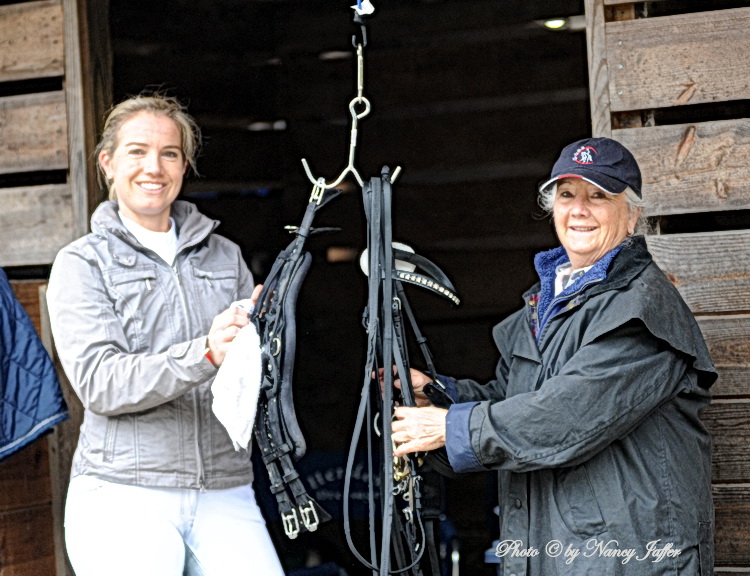
Bridget Hay and her mother, Barbara, cleaning tack during Dressage at Devon in 2016. (Photo © 2016 by Nancy Jaffer)
Early in her career, Barbara worked for breeder Gordon Smith, starting all the babies of his Trakehner stallion, Parliament.
Their breeding project began with Ming, an Oldenburg mare by Weltstern, who Barbara got in trade by riding for Ilona English. Ming became the foundation of the Hays’ program, in which Barbara played a major role.
“Her thing was breaking young horses. She helped me start all the babies here,” said Bridget, noting her biggest challenge came when her mother wasn’t able to work with her anymore after her diagnosis in 2020.
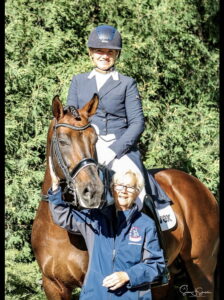
Barbara Hay with Bridget on Faolan at the 2022 USEF Festival of Champions. (Susan J. Stickle Photography)
Barbara’s husband, James, died 11 years ago on Dec. 28. In addition to Bridget, Barbara is survived by her son, Ryan; four grandchildren, Ryder, Audrey, Amelia and Julianna, and her sister, Susan Gaukin.
Visitation is 5-8 p.m, Jan. 2 at the Holcombe-Fisher Funeral Home in Flemington.
A Mass of Christian Burial will be offered at 10:30 a.m. Jan. 3 at St. Alphonsus Church in Hopewell, with a reception to follow.
Donations in Barbara Hay’s memory may be made to the U.S. Pony Club (https://www.ponyclub.org)
A celebration of life will be planned at the farm in the spring, with a date to be determined.
by Nancy Jaffer | Dec 27, 2023
The prize money for the 2024 Longines FEI World Cup show jumping finals in Riyadh, Saudi Arabia has been doubled by the organizing committee to a record 2.6 million Euros.
Another 100,000 Euros has been added to the purse for the dressage finals, bringing the total to 400,000 Euros. This is the first time the finals, set for April 16-20, will have been held in the Middle East.
In 2023, Riyadh hosted 11 FEI events, with 12 more planned for 2024. In 2026, when the other world championship disciplines will be staged in Aachen, the Saudi city of Al Ula will host the FEI Endurance World Championship.
The Saudi show jumpers will be competing in the 2024 Paris Olympics. The Kingdom of Saudi Arabia previously earned two Olympic medals in jumping, an individual bronze in Sydney in 2000 and a team bronze in London in 2012.
Unlike 2023, when the vaulting World Cup finals were in Omaha alongside show jumping and dressage, they will solo in Basel, Switzerland next month. The FEI Driving World Cup™ Final will be held in Bordeaux, France during February.
by Nancy Jaffer | Dec 26, 2023
Make sure you vaccinate your horses in 2024.
An unvaccinated 28-year-old mare in Ocean County, N.J., had to be euthanized after becoming the third confirmed case of Eastern Equine Encephalitis (EEE) in the state for 2023 .
She suffered from depression, front and rear ataxia, disorientation and falling. EEE cases also were diagnosed in Gloucester and Salem Counties in September and October.
Although the disease usually appears during mosquito season, this case occurred beyond the expected mosquito-borne disease season for New Jersey. The horse had no recent travel history, indicating that the disease was transmitted within the state. Based off the clinical history, it is possible that exposure to EEE occurred during a period of warmer than average temperatures in the area at the end of mosquito season.
Livestock owners are strongly encouraged to vaccinate against West Nile Virus, EEE, and other mosquito-borne diseases. Effective equine vaccines for EEE and WNV are available commercially. Horse owners should contact their veterinarians if their horses are not up to date on their vaccinations against both EEE and WNV.
“We continue to encourage horse owners to be vigilant in vaccinating their animals against these diseases spread by mosquitoes,” New Jersey Assistant Secretary of Agriculture Joseph Atchison III said.
“Vaccinated animals are much less likely to contract deadly diseases such as EEE and West Nile Virus.”
For more information about EEE in horses, visit the New Jersey Department of Agriculture website at this LINK
EEE and West Nile virus, like other viral diseases affecting a horse’s neurological system, must be reported to the State Veterinarian at 609-671-6400 within 48 hours of diagnosis. The New Jersey Animal Health Diagnostic Laboratory is available to assist with EEE and WNV testing and can be reached at 609-406-6999 or via email – jerseyvetlab@ag.nj.gov.
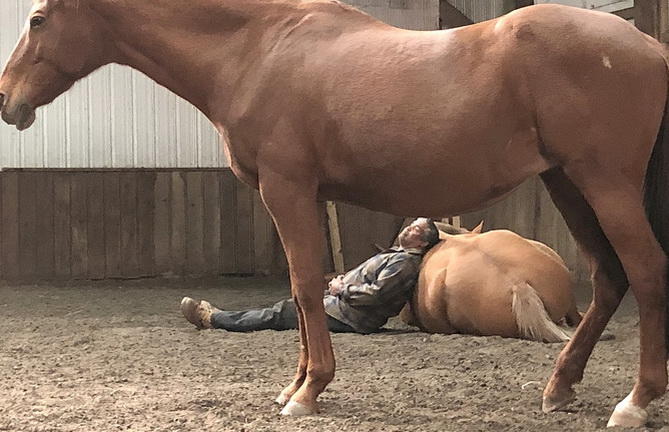
by Nancy Jaffer | Dec 22, 2023
Miss Molly can’t tell the story of how she wound up in two Texas auctions, just a short step from being sent to slaughter. But the scars on the palomino Quarter Horse’s face and legs; the way she bit at people, aiming to wound them, or kicked hard enough to leave more than a mark, spoke for how she had been treated.
A trainer who saw her photo bought Molly out of a kill pen, bringing her to a barn in Hillsborough, New Jersey, as a prospective lesson horse. But from the beginning, it was obvious Molly had big issues.
“Whatever you do, don’t take off her halter,” the shipper who dropped off the horse warned the trainer. And this was a mare advertised by the killl pen as “well-broke, extremely sweet, friendly and gentle.”
However, “It was very clear within a few days that she would never be a lesson horse,” said Christianna (CC) Capra, the co-founder of Spring Reins of Life (SRoL), a therapeutic organization that was based at the Hillsborough stable when Molly arrived. The mare’s tendency to bite and kick looked as if it would spell her doom. The prospect of euthanasia was right around the corner.
“She was not handleable. Anyone who came near her, she would react this way,” said CC.
There was one exception.
Veterans who had been receiving therapy with SRoL walked up to the round pen to see Molly and would pet her on the face.
“She had her ears forward and was like `Hi, how are you?’” CC recalled.
“I saw that out of the corner of my eye,” CC said, wondering at the time, “She hates people. How does she not hate you? There’s something about this horse and veterans.”
Just before SRoL moved to Hunt Cap Farm in Three Bridges six years ago, seven women joined together as Team Molly to pay the mare’s bills and give her a chance.
The trainer who owned Molly agreed to let CC take her, with this admonition: “If she doesn’t work out as a veterans’ horse, you’ve got to let her go.”
SRoL is an EAGALA (Equine Assisted Growth and Learning Association) Model Program offering equine-assisted psychotherapy for groups of trauma survivors. It uses horses for therapeutic intervention designed to reach veterans, teens, women at risk or others who have a hard time in traditional talk therapy.
Horses are selected for their capacity to work with troubled or suffering individuals. These clients are able to develop personalized coping skills from interacting with horses on the ground (the program does not involve riding.)
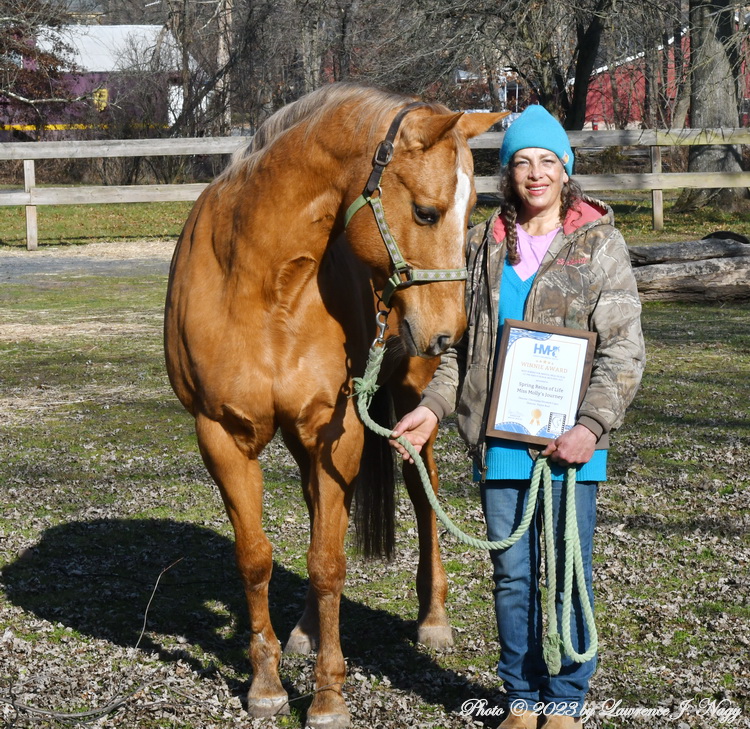
Molly with Christiana Capra and her Winnie award. (Photo © 2023 by Lawrence J. Nagy)
Dr. Judith Shoemaker, a Pennsylvania veterinarian who specializes in integrative medicine (which includes chiropractic and acupuncture) worked with Molly to overcome her reflexive reaction of biting and striking. Also involved with Molly’s program is Dr. Maria Katsamanis of Hopewell, New Jersey, an author and dressage trainer who has a doctorate in clinical psychology.
Molly soon proved her worth.
“It was really the veterans who opened her up,” said CC.
“She’s highly intelligent. Molly would approach someone in the arena; if they’re really suffering, she would leave the wall and go to them.”
Perhaps the most dramatic example of how Molly connects with veterans involves Stephen Cherry, who was referred to SRoL eight years ago by the Lyons Veterans Administration Hospital.
The 65-year-old retired Air Force veteran had seen Molly at the Hillsborough farm, and asked CC if he could go in the ring with the mare.
He got permission, with the proviso that if Molly showed any adverse reaction, he would be pulled back.
Steve was advised to watch the mare’s eyes and ears; then he walked in slowly, as if he were rehearsing the wedding march. He approached Molly, kneeling in a submissive manner, and finally was able to lean on her shoulder. It was a special moment.
“I felt an instant connection right there,” said Steve.
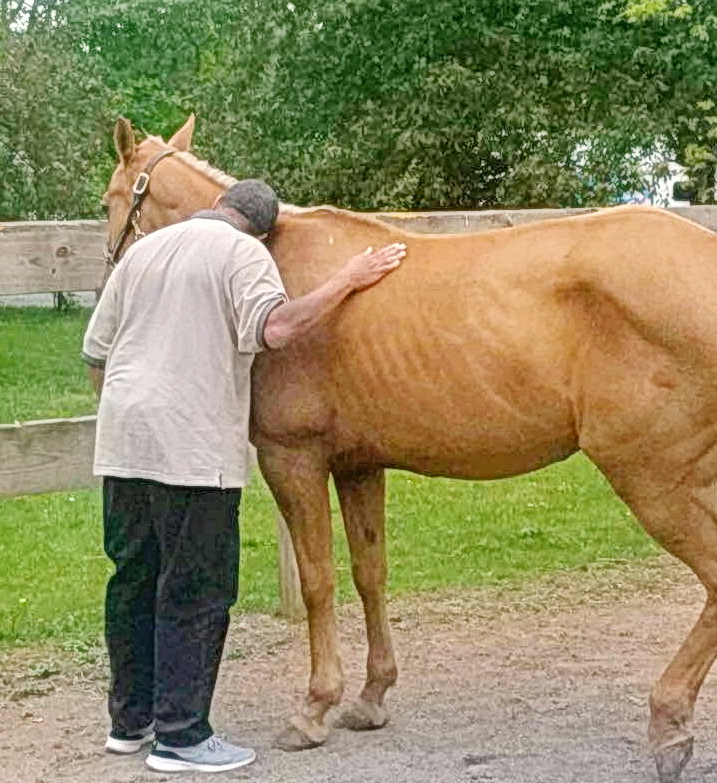
That moment when veteran Steve Cherry made his first connection with Miss Molly, shortly after she came to New Jersey.
“The thought of being loved was something I could feel in that horse.”
Everyone who saw that breakthrough was so moved they were crying, noted CC.
Now each Tuesday and Friday, Steve visits Molly, so eager to get there that he wakes up at 4 a.m.
“I have a responsibility,” he explained.
Steve feeds and grooms Molly, takes her to the paddock, then handles another important duty: “One thing I love to do with a horse is give them a little kiss,” he confided.
At first, he was worried about approaching her, after finding out from a psychic how she had been mistreated. But he stayed with it.
“And she’s done nothing but respond to me. Miss Molly has brought out the best in me I’ve ever been,” he stated firmly.
“She has gone from being a frightened, uncared-for horse to one that’s willing to accept people. I’ve had days I get down on the ground and lie down and she would lie down, I would crawl towards her, give her a kiss and then I’m lying across her back.”
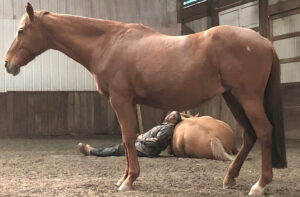
A glimpse of Steve Cherry sleeping on Miss Molly, as another horse stands watch.
“I have a slight form of PTSD (post-traumatic stress disorder) I didn’t want to be around people at all. But now, the people that are involved with the horses — I’m talking to people, I’m working with people, I’m laughing. I’ve actually come out of my shell. I’ve gone from city boy to country boy.”
He owes so much of his progress to Miss Molly.
“It’s wonderful. She understands me. What I’m doing now is just a start, I plan on doing anything in the world I can for this horse, and any other horses after this.”
Sean Glynn, a volunteer at the barn, is another who greets Miss Molly with a kiss.
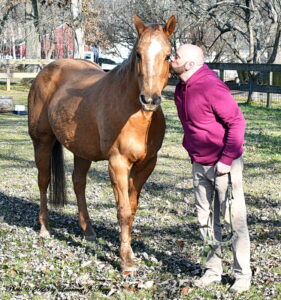
Volunteer Sean Glynn always gives Miss Molly a special greeting. (Photo © 2023 by Lawrence J. Nagy)
“When she’s calm, I feel some type of energy from her. Whether she’s in a good mood or a bad mood, I can feel that vibe.”
He noted, “Just by her actions, It’s sad to say someone probably abused her, hurt her. Now that she’s here, I think she trusts people a lot more.”
Molly has gotten recognition beyond the accolades from those she has helped in the SRoL program.
In 2019, she was named the U.S. Department of Veterans Affairs/New Jersey Health Care System’s Therapy Animal of the Year. Her video story, “Miss Molly’s Journey,” won a Winnie award at the 2023 Equus Film & Arts Festival in the category of Horses for Mental Health.
Steve noted, “She seems to feel something in people like us: `Oh, I’m going to come over and stand next to you. Oh, you’ve got some kind of a problem? I kind of understand you’.”
But now Molly has a problem.
She hit her head on a stall door, which exacerbated what is possibly an old concussion, leaving her with what Dr. Shoemaker said may be comparable to traumatic brain injury (TBI) in a human. That resulted in a loss of equilibrium when she walks. She has to move on a flat surface; it is difficult for her to step up, but Steve has no problem getting her in and out of the paddock with the incentive of treats.
Meanwhile, Molly is on hiatus from her therapeutic duties. The mare sees the world in a distorted way, due to a visual problem with her depth perception, so it isn’t safe for her to work with clients at this time.
Because SRoL’s mission is to rehabilitate people, that organization cannot spend money on helping a horse. After Team Molly ran its course, Dr. Maria’s Friends of Pegasus foundation has become the avenue for funding that can be used for Molly’s treatment, which includes special food, veterinary care and other therapy.
For a complete rundown on Miss Molly, a look at her award-winning video and how to help by contributing via Venmo and Paypal so she can get the help she needs, click on this LINK
To contribute by check, make it out to Friends for Pegasus (make the memo Miss Molly) and send to Friends for Pegasus at Mythos Farm 128 Lambertville Hopewell Road Hopewell, N.J. 08525.
“Head trauma or soft tissue injury as a result of training or mishandling and injury is not much spoken about,” Dr. Maria noted, but it can happen when “people get harsh with horses” or use poor equipment. Behavioral issues, she said, “can very well be untreated concussive injuries.”
The horse can perceive things in their space very differently than it would if their brain were normal.
“Then people deem it dangerous, or it gets itself into harmful situations,” she commented.
They put on more pressure, thinking it’s a behavioral issue, when actually the horse’s perception is off.
“Molly must have seen very harsh handling,” Dr. Maria believes.
She pointed out that “because we could see the injuries on her face, we could deduce there was some jostling of the brain.”
One way of addressing the situation was “a breathing protocol that we used to reverse her severe hyperventilation and poor breathing behavior,” combined with a visual motor process protocol.
As Molly progresses, said Dr. Maria, “People will see themselves in her eyes. They will cheer her recovery on and therefore, their own.”
Molly definitely makes an impression.
“She is truly an exceptional therapy horse,” said Dr. Shoemaker.
“She has appreciated the care and concern for her. She likes being touched now more than she did, and touch is such an important part of TBI programming. You want to reach as many corners of her brain as possible, and all those corners of her brain are connected to her body.”
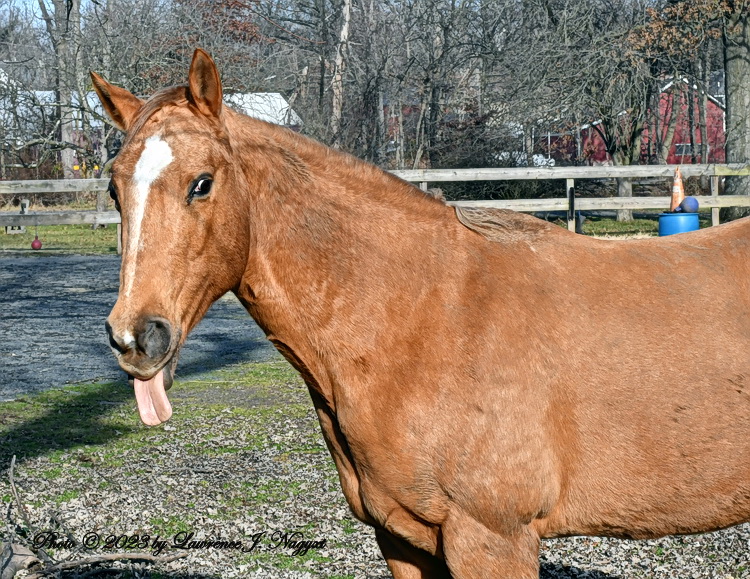
A happy Miss Molly after a good roll and a treat. (Photo © 2023 by Lawrence J. Nagy)
The veterinarian said she is hoping that “will open up other places in her brain to help her have a more enriched life. Look at all the people who come through this program that people have written off. Yet with the proper kind of therapy, it’s possible to see miraculous changes.
“She’s in the right place to give it a try. Her job is such she doesn’t have to be cross-country riding sound. She has to be upright, safe and happy.”
For a complete rundown on Miss Molly, a look at her award-winning video and how to help by contributing via Venmo and Paypal so she can get the help she needs, click on this LINK
To contribute by check, make it out to Friends for Pegasus (make the memo Miss Molly) and send to Friends for Pegasus at Mythos Farm 128 Lambertville Hopewell Road Hopewell, N.J. 08525.
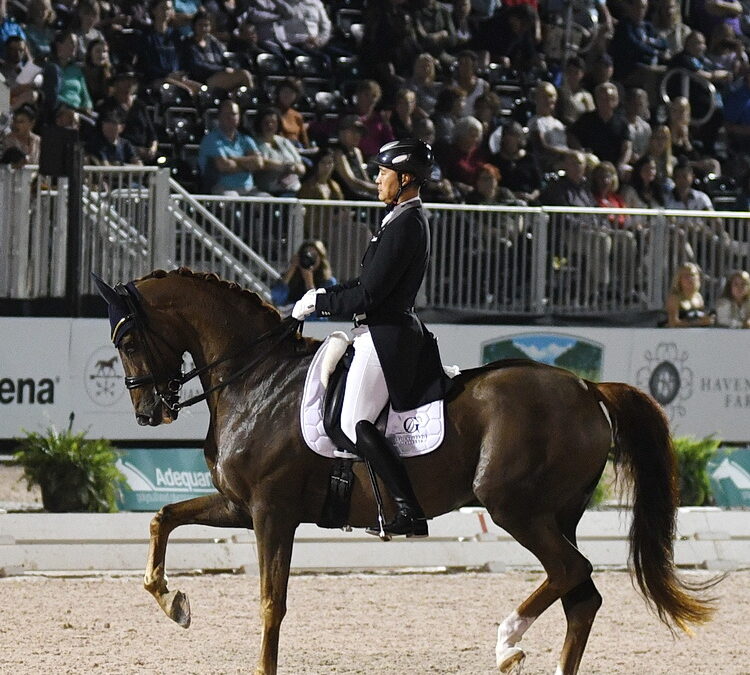
by Nancy Jaffer | Dec 22, 2023
With the 2024 Paris Olympics looming large (the opening ceremonies on the Seine will happen in seven months) two new international-caliber horses have been purchased by Zen Elite Equestrian Center for American riders.
The farm near Fort Lauderdale has bought Bohemian, the son of Bordeaux ridden to fourth place with a mark of 87.507 percent in the Tokyo Olympics by Cathrine Laudrup-Dufour of Denmark. The 13-year-old Westphalian gelding will be competed by Endel Ots, Zen’s resident trainer. He does not have any international results at Grand Prix level.
After the Tokyo Olympics, Bohemian was sold to South Korean rider Dong-Seon Kim, who finished 43d in the 2016 Olympics with Bukowski. Kim was a candidate for Paris, but he dropped that ambition and the horse came up for sale again. Bohemian was ridden since August by Patrik Kittel of Sweden. Their best score together was 75.872 percent for the Special in Herning, Denmark, two months ago.
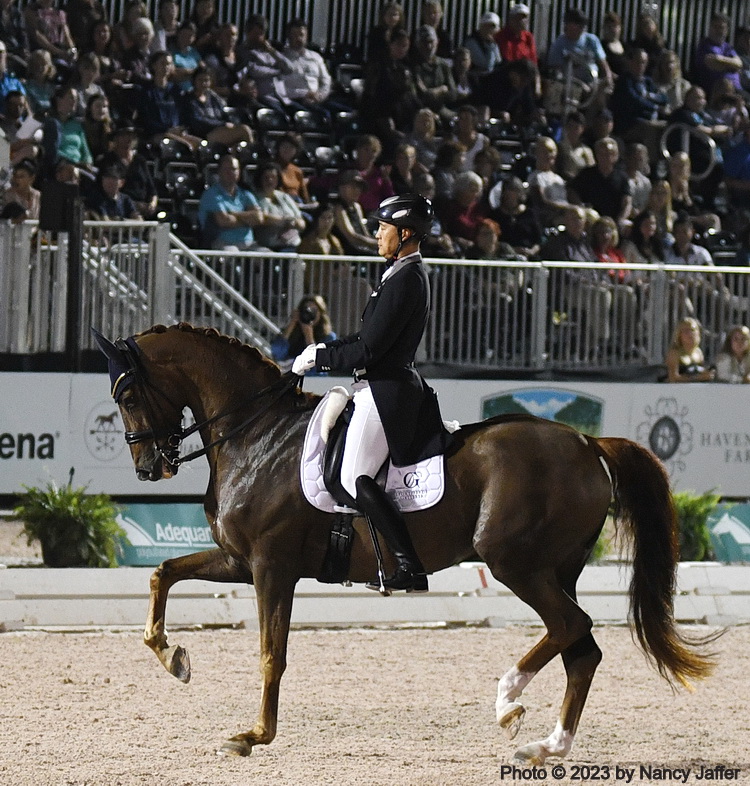
Bohemian competing at the 2023 Global Dressage Festival with Dong Seon Kim. (Photo © 2023 by Nancy Jaffer)
And Pan American Games team gold medalist Christian Simonson now will be riding Fleau de Baian, trained by the Netherlands’ Adelinde Cornelissen. Christian trains with U.S. Olympian Adrienne Lyle. Fleau de Baian is a KWPN (Dutch) stallion by Jazz. That horse’s best score with Adelinde was 78.325 percent in May’s Grand Prix Freeestyle at Exloo, Netherlands.
Christian, a star in the Young Rider ranks, won both the I-1 and Prix St. Georges on the mixed team at the Pan Ams with Son of a Lady, but does not have any international Grand Prix results.
“We have some really amazing horse/rider partnerships that we are excited about this season, and we are so proud to be supporting USA Dressage,” said a statement from Zen
Zen owner Heidi Humphries explained her plan in creating the facility was to develop a world-class sport horse center with the feel of a spa, oriented toward Broward and Dade counties south of equestrian hub Wellington in Palm Beach County.
With a 20,000-square-foot insulated covered arena, two outdoor arenas and a rehab/spa/gym for horses and humans, Zen Elite Equestrian Center is a full-service facility in Southwest Ranches.

by Nancy Jaffer | Dec 16, 2023
There’s more to Somerset Grain & Feed than its name implies.
In addition to selling sustenance for horses and other animals, grooming tools, pet toys and various agricultural items, it is also a quaint mini museum on the outskirts of suburban Bernardsville, New Jersey’s, shopping district.
Somerset Grain is very down-home, almost as if it doesn’t belong there. And in less than six months, it won’t.
The business that hearkens back to an earlier era and its country roots is moving 10 miles west to the more rural Long Valley section of Washington Township, Morris County. But it won’t be changing its style or its name.
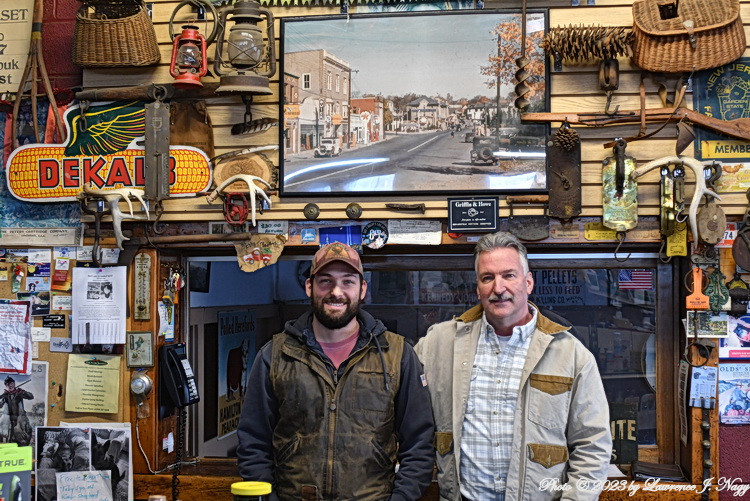
Tom Milesnick and his son, Jesse, left at the counter of Somerset Grain and Feed. (Photo © 2023 by Lawrence J. Nagy)
“That’s who we are,” proprietor Tom Milesnick stated proudly.
“We’re a feed store. That’s our identity.”
The move is the rainbow at the end of an 18-year quest for Tom, who is in business with his 26-year-old son, Jesse. Tom doesn’t own the Bernardsville building and the rent kept rising, so he needed to set up shop elsewhere. The former UPS facility where he’s headed fills the ticket. And while it’s spacious, with room for tractor-trailers and trucks to maneuver more easily than at the Bernardsville site, the location also is appropriate because Long Valley and neighboring Hunterdon County have more farms in this era than northern Somerset County.
“Back in the day, we had all these big estates,” Tom recalled, citing such historic Bernardsville family names as Roebling and Post. Early in the last century, they would mail the store their orders, written in perfect penmanship, for 5,000 pounds of cattle feed or 1,000 pounds of sheep feed, and the business would run it up to them.
As time went on, the farm owners died, the barns got converted to houses, the acreage was carved up “and there’s no more big estates,” sighed Tom, guessing there might be just a “backyard pony or two” left in Bernardsville, where bridle trails once wound through the borough.
In the bigger picture, though, he has always dealt with farm owners in nearby Bedminster and Harding Township, as well as places further afield, such as Oldwick.
“Thank goodness this area’s still equine, and thank goodness for the people who do have the means to preserve what we have,” he said.
Tom congratulated the officials of Washington Township, telling them “You have maintained the integrity of this valley, you’ve let it grow, let new business come in, without compromising it.”
The chickens, horses, pigs and other livestock still have a home there, he pointed out.
Many of those who have been coming to Somerset Grain for years will redirect their GPS settings for the new venue on East Mill Road.
Asked for his opinion of the move, customer Rob Pullam said, “I don’t know if it’s good for Bernardsville, but it’s fine for us. I’m quite excited.”
The Bedminster resident and farm manager added, “Where they’re going is not that far from us, and it’s a different direction. Now we’re going to go somewhere else and see the same people.”
But for others who have dropped in at Somerset Grain on a regular basis for years, it’s the end of an era.
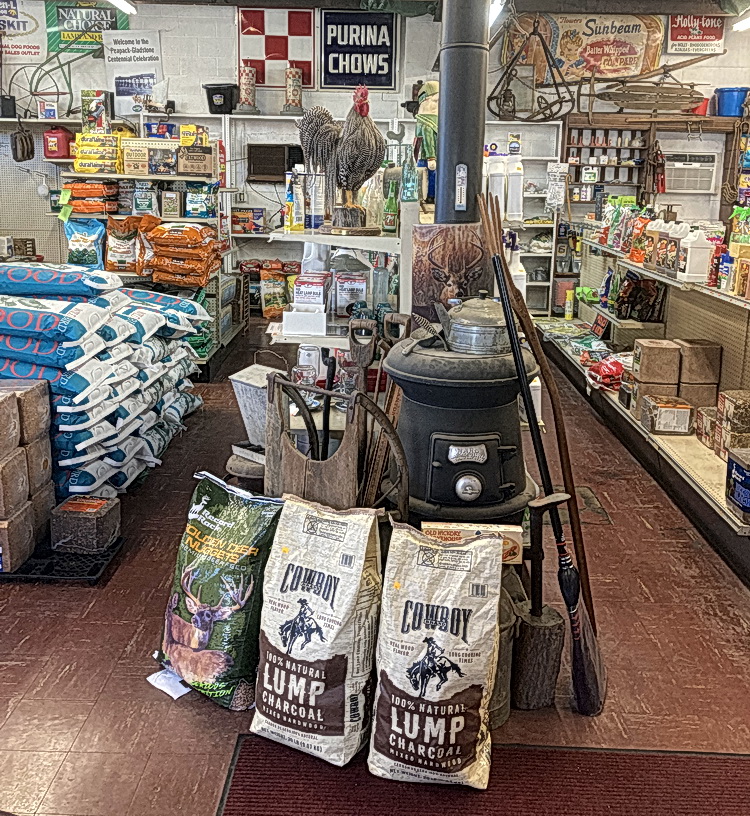
The potbellied stove at the end of one of Somerset Grain’s eclectic aisles will be moving to Long Valley. (Photo © 2023 by Lawrence J. Nagy)
“I’m really sorry that they’re going to Long Valley, which is too far for me,” said longtime regular customer Simona Balzer of Bernardsville, who was buying a Christmas present for her daughter’s dog the other day.
“It’s so fun to come here. This store is something. It has so much history,” she noted wistfully.
Somerset Grain, which opened in 1945, is the third feed store on the Bernardsville site. The first one, in the late 1800s, was Bob White and Son. Tom found a pen from that store at a sale and it’s a treasured artifact, marked with the White store’s phone number, 209. That is not an area code; there just weren’t that many phones back then. After Bob White, the store became Barker and Higgins before it was Somerset Grain.
At one time, dating back to the late nineteenth century, grain was milled at the location. Before the advent of tractor-trailers, train cars filled with different grains would come to the store via a siding from the main track. Workers shoveled loose grain from the cars, then sent it up the three-story tower to get ground. The finished product went into 100-pound bags secured with a miller’s knot. The empty rail cars would roll back to the main track and get hooked up to the train again.
Tom pointed out that the feed store “was the gas station of its time.”
It fueled the horses who pulled the wagons and livestock; “everything was powered by the feed store,” he commented.
Well-schooled in the business, Tom is adamant about “the right way to run a feed mill, order six days worth of feed every seven days. You only stayed a little bit ahead of your stock and got new every week. The less time we have the feed,” he explained, “the longer you can keep it.”
A disastrous fire put an end to the milling operation in 1968, as hay and grain fed the blaze for three days. The fire was suspicious, but no one ever determined how it started, and Tom noted that G.F. Hill in Gladstone also burned around the same time.
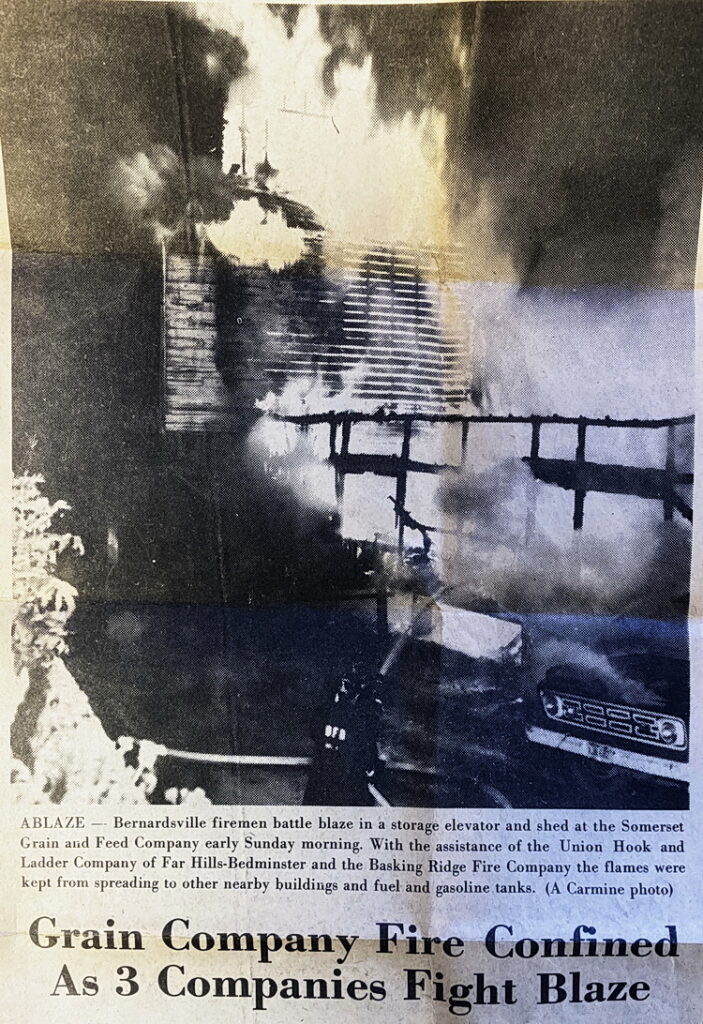
A photo from a Bernardsville News story about the 1968 fire.
Asked whether he will miss the old store, Tom said, “I’ve been coming here 42 years. I’ve been here more than I’ve been in my own house.”
So there’s nostalgia, but he quickly added, “I’m excited about the future.”
Before coming to Somerset Grain, Tom was working at the Veterans Administration supply depot in south Somerville.
“It was crazy money for a kid,” he noted, but punching a time clock and working in a place surrounded by barbed wire wasn’t for him. When a new employee came to the depot after leaving a job at the feed store in 1981, Tom saw an opportunity. Although he’d been earning $14 an hour, he took a huge cut to $5.75 an hour when he got a job from Pete Mastrobattista, who owned Somerset Grain at that time.
Pete couldn’t believe Tom wanted to give up his secure government job, and neither could Tom’s mother.
He remembered, “My mother cried, she grabbed my arm and said, `You’re not thinking clearly.’ ”
He replied, “I’m being true to my heart. This is what I want to do.”
It turned out to be the right decision.
“I’ve enjoyed every day in this place,” he declared.
Every weekend, “I couldn’t wait to come back here on Monday morning. I can’t believe I’m getting paid to do this. It’s been freedom.”
Tom remembers in the early ’80s, he’d get to the store when it was pitch black outside and three or four farmers already were waiting for the doors to open, reading the newspaper with their trucks’ cab lights on. They’d come in as soon as he turned the key, share a pot of coffee and talk about their animals and their crops.
“Those were the good old days,” said Tom.
“Thank goodness I got a chance to see that old guard.”
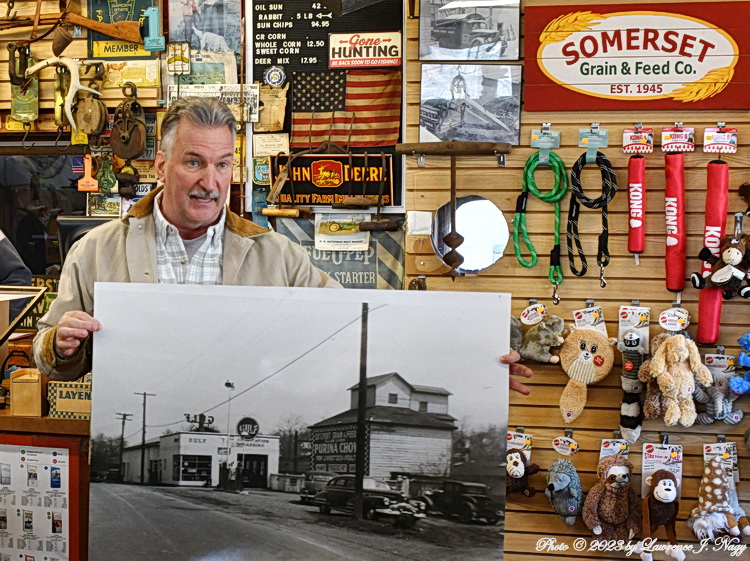
Tom holds a photo of the old store from the 1940s or early 1950s. You can see the milling tower that would be destroyed in a fire years later rising above the building. (Photo © 2023 by Lawrence J. Nagy)
Now his enthusiasm has refreshed, as he’s eager to open a new place and become part of the scene in Long Valley.
“I’m coming in there to make friends with everyone. I want to reach out to the people of that area. I want to know, `What would you like us to bring in?’ ”
Tom plans to devote an aisle to Long Valley products, such as honey, sausage, items from the “home farms.”
“Socks, soap, sauce,” he elaborated.
Prior to the move-in, he’s gutting the interior of the building that was in the Hemmings family for 90 years and once housed a moving company.
“I want it all wood and barn beams,” Tom noted.
“When you walk in there, I want you to think you walked into somebody’s barn. We’re going to have the wood stove, my old signs.”
The ones relating to Bernardsville will stay in the borough, because they are part of its history. But the others undoubtedly will pique the interest of their new audience in Long Valley.
They are an eclectic bunch, those signs and accompanying memorabilia, including the Kennedy/Johnson 1960 presidential campaign poster he rescued from a dumpster, and the one from a poultry feed company advising chickens to, “Lay or Bust.”

Intriguing signs are a trademark of Somerset Grain.
Tom found that in the old portion of his store when he was using a broom handle to break ceiling panels, having considered that area a possible fire hazard.
After he gave the ceiling a good poke, “down came this treasure trove of stuff,” including invoices from the 1900s and sadly, a dead cat who had succumbed to the 1968 fire.
The current store was built in 1947 as an addition to the original structure, where wooden bins used to hold barley, whole oats, bran, cracked corn and grass seed. Tom ripped out the wooden bins and stopped weighing out the merchandise. Instead of 10 pounds of flax, customers had to buy a bag of it. The floor was too weak for the weight of the bags, so it was shored up with metal—coffee cans, license plates, old road department signs, and insulated with hay to keep the heat in. Tom replaced the floor, keeping only a bit of it for the sake of nostalgia.
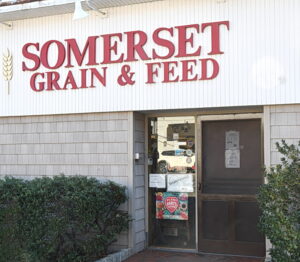
The front entrance of the store. (Photo © 2023 by Nancy Jaffer)
Tom grew up with dogs, and seeing to the pheasants and quail his family raised.
“That’s where the responsibility came of taking care of a domestic animal; domestic animals are dependent on us. That rang true with me,” Tom observed.
“People need us. We’re tougher than the mailman or the banks.”
No matter the weather, “we show up and deliver feed, even when you wouldn’t let your dog go out. If you’ve got a 1,200 pound animal that’s hungry, kicking the walls, what are you going to say?”
Rain, snow, sleet, whatever, “We go.”
Tierney Sullivan, who ran Coach Stop saddlery in Bedminster from 1979 to 2015, noted Tom “has stood the test of time. As far as the local horse community goes, he’s kind of like the glue.”
Tierney and Tom would share customers and help each other out; if he needed a green halter, she’d send it along; if she needed Farrier’s Formula, he’d provide it.
“He fed them and I outfitted them,” she said.
Tom, who is 64, at some point down the road will retire and hand the business over to Jesse.
He has another son who is in information technology, but Jesse “likes this kind of work. He and I are exactly alike,” Tom mused.
“He’s a hard-working, good kid.”
Jesse started working at the store when he was in high school, going full-time in 2019. It was always assumed he’d take over the business.
“I never fought it,” he said with a smile.
“It’s always been like a second home to me, because I basically have grown up here. It will be nice to have something we can put money into and improve, something for the long run.”
Jesse is getting some part-time help from his girlfriend, Brianna Graf. Formerly a whipper-in for the Essex Foxhounds, she now has a job on a horse farm and her own MagnaWave business, providing therapy to horses. The two met when she was picking up feed at the store, and they obviously have a lot in common.
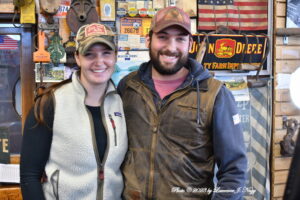
Brianna Graf and Jesse Milesnick are working side by side. (Photo © 2023 by Lawrence J. Nagy)
She notes her extensive equine background is a real plus in assisting customers with questions about their horses.
Somerset Grain is all about service, doing the basics and doing them right, without bells and whistles.
“There are certain things that deserve to be kept simple, and this is one of them,” said Tom.
“It gives you good purpose.”
Tom noted the one downside of the move is that “We’re going to lose a handful of my older customers in their 80s that buy their birdseed. Them I’m going to miss; they’re not going to drive 10 more miles to get bird seed. We do have a couple of people with some driving issues and we bring birdseed to their porch. We still will do that. We can’t forget you.”
by Nancy Jaffer | Dec 15, 2023
A new documentary from FX about horse racing will air next year, contending that fans “increasingly wonder how long one of America’s oldest sports can continue to have its social license renewed.”
Called “The New York Times Presents: Broken Horses,” the documentary will examine “the systemic issues, questionable practices and urgent calls for change that have shaken horse racing to its core.”
Citing the series of horse deaths before the 2023 Kentucky Derby and afterwards during the Triple Crown series, an investigative team looks into why horses on the track break down so frequently.
This is the type of exposure that was discussed during the U.S. Hunter Jumper Association’s annual meeting this month, underlining why even in non-racing horse sports, there is a need to insure that the welfare of horses is put above everything else in pursuing these activities. Those commenting on the subject advised everyone to remain aware that in the era of videos, nothing goes unnoticed.
The FEI’s (international equestrian federation) Equine Ethics and Wellbeing Commission presented its final report at November’s General Assembly. It will serve “as a blueprint for future-proofing equestrian sports,” and offers 30 recommendations toward that goal.
But if you take only one thing from the commission’s work, it is this: “Everyone is responsible for the future of equestrian sports. All equestrians need to optimize and prioritize equine welfare and be seen to be doing so.” (Emphasis mine).
Think about the fallout this autumn from the undercover documentary on training methods at Helgstrand Dressage, even though that was not officially aired outside Denmark.
In its statement, FX called its production, “a story of reckless breeding and doping, of compromised veterinarians and trainers…”.
The FX racing documentary will offer “confidential documents, recordings and exclusive interviews, to provide “a vivid tour of the business and political forces that control the Sport of Kings and resist measures to implement changes that could decrease horse deaths.”
by Nancy Jaffer | Dec 9, 2023
The website Eventing Nation carried this very interesting story by Veronica Green-Gott about how an activist Ocala group (www.horsefarmsforever.com) saved its horse country from construction of a connector road that would have torn up the best farms in Marion County, Fla.
There’s a lot to learn from reading this. It’s worth a close look from Wellingtonians concerned about the future of their Florida horse community, or anyone else around the country in an area where the equestrian lifestyle is threatened by development. Here’s a link: https://eventingnation.com/horse-farms-forever-equestrians-unite-to-save-ocala-horse-farms/
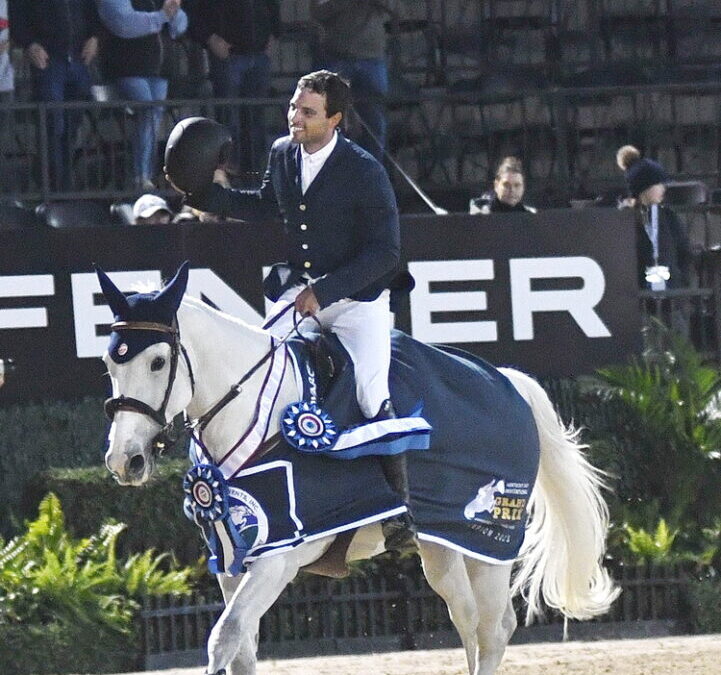
by Nancy Jaffer | Dec 7, 2023
The rating of the show jumping grand prix held during the Land Rover Kentucky Three-Day Event will be elevated to a 5-star in 2025, to match the eventing competition’s status.
The Kentucky Invitational, held on the evening of the eventing cross-country at the Kentucky Horse Park in Lexington, attracts a big crowd to the Rolex stadium. It also attracts some big names. The $226,000 3-star 2023 grand prix presented by Hagyard Equine Medical Institute, was won by Daniel Bluman. Others in the line-up included McLain Ward and Conor Swail.
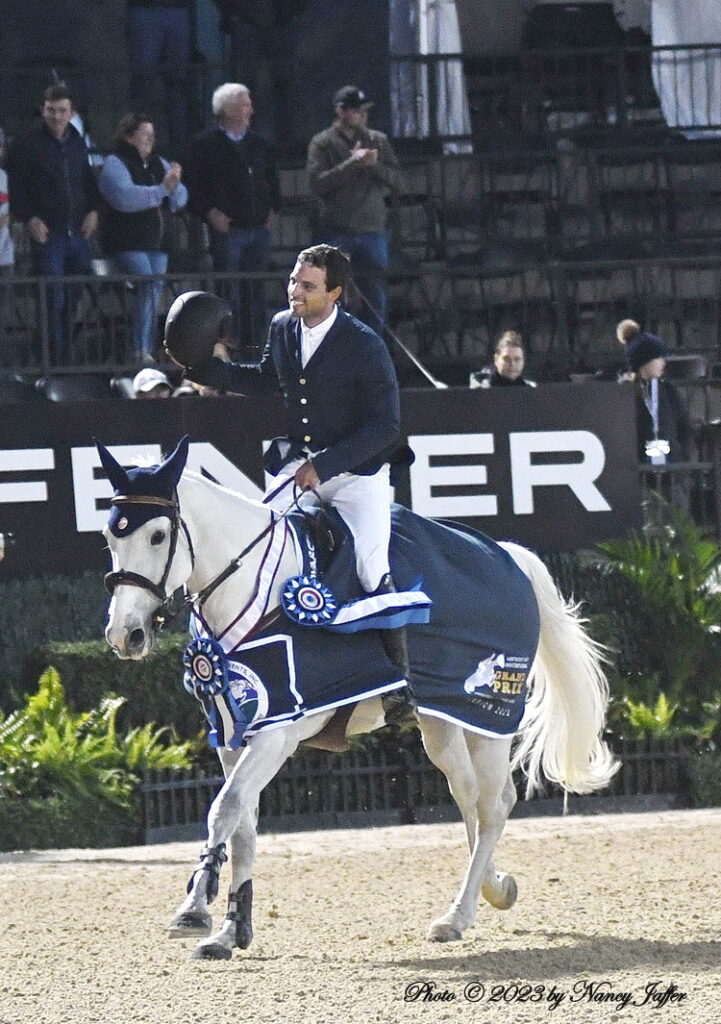
The 2023 3-star grand prix winner, Daniel Bluman on Gemma W, takes a victory lap. (Photo © 2023 by Nancy Jaffer)
For 2024, the grand prix will become a 4-star. Equestrian Events Inc., which offers the 5-star eventing and the grand prix, is seeking proposals from show management companies for the jumping. The deadline is Jan. 15.
































